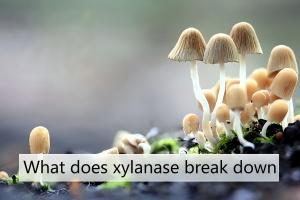What does xylanase break down

Xylanase is an enzyme that breaks down xylan—a complex carbohydrate found in the cell walls of plants, especially in things like wheat, corn, and wood. Xylan is made up of a sugar called xylose, and xylanase helps cut it into smaller, more usable pieces. That makes this enzyme pretty valuable across different industries, from baking to animal nutrition to paper production.
What Exactly Does Xylanase Break Down?
Xylanase targets xylan, which is a type of hemicellulose. Hemicellulose is a structural part of plant cell walls, right alongside cellulose and lignin. While cellulose is super tough and fibrous, xylan is a little easier to break apart. Xylanase goes in and snips the bonds between the xylose molecules in xylan, turning it into smaller sugars like xylooligosaccharides or even single xylose units.
Why It’s Used in Food Processing
In baking, xylanase is used to improve dough texture, volume, and shelf life. By breaking down the xylan in wheat flour, it helps release water and sugars that make dough softer and easier to knead. This also helps bread rise better and stay fresher longer. You’ll often find xylanase used in commercial bakeries for exactly this reason.
Xylanase in Animal Feed
Poultry and pigs can’t naturally break down all the fibrous parts of grains. That’s where xylanase steps in. Added to animal feed, it helps break down the xylan in wheat, barley, and corn, making the nutrients more available. This improves digestion, boosts weight gain, and even reduces waste because the animals absorb more of what they eat. It’s a common additive in modern livestock farming.
Its Role in Biofuels and Paper
Xylanase is also used to make paper production cleaner and more efficient. It helps break down plant matter during the pulping process, which means fewer harsh chemicals are needed to bleach and treat the paper. In biofuel production, xylanase breaks down plant biomass into sugars that can be fermented into ethanol or other fuels. So it plays a behind-the-scenes role in sustainable energy too.
In Human Digestion and Supplements
Some digestive enzyme supplements include xylanase to help people digest plant-based foods better. While our bodies don’t naturally produce this enzyme, it can assist in breaking down fibrous foods like whole grains and veggies, especially for those with sensitive stomachs. By reducing bloating and increasing nutrient absorption, it’s become a popular addition to gut health formulas.
